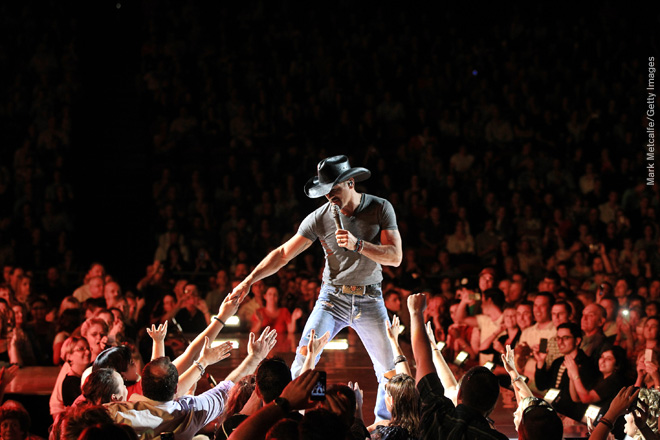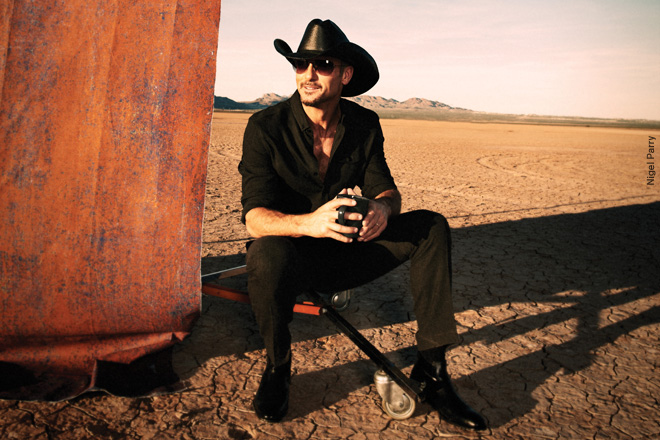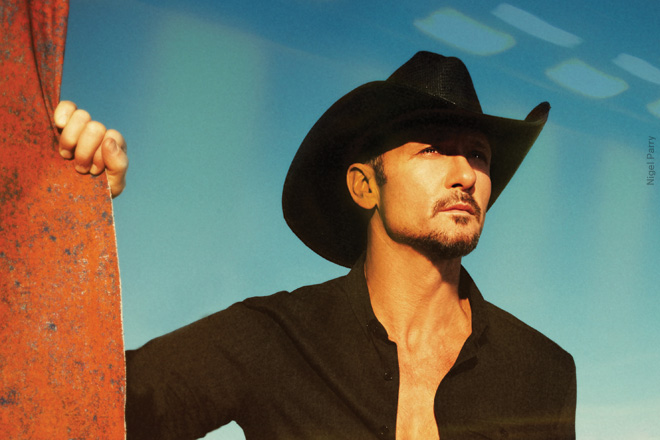
Two decades into his superstar career, Tim McGraw is still hungry for new musical adventures
Tim McGraw is a man in motion. Twice a day, even while on tour, he hits the gym—lifting weights in the morning and devoting a couple of hours to a grueling CrossFit regimen in the afternoon. The concept of constant movement is also the driving force behind his creative philosophy.
“I’m always looking for something that propels me forward and makes me want to work harder,” he explains. “I don’t want to get complacent, or start thinking I can just relax. That’s been the main impetus for all the changes I’ve made over the last four or five years. It’s a matter of looking for ways to move forward, and not get stagnant.”
Stagnation has never been an issue for McGraw, Nashville’s most successful male artist for the past decade. Still, his entry into country music hardly seemed predestined. Raised in small-town Louisiana by his mother—she divorced McGraw’s stepfather when McGraw was 10—the singer attended Northeast Louisiana University on a baseball scholarship. His skills came naturally—at age 11, he learned that his biological father was Major League pitching star Tug McGraw.
Soon enough, the lure of music won out over studies in sports medicine, and in 1989 McGraw dropped out and bought a bus ticket to Nashville. Landing a deal with Curb Records in 1992, he scored his first Top 10 single two years later with the novelty tune “Indian Outlaw,” and a nonstop string of hits soon followed. McGraw is quick to credit his mother for the confidence to pursue the long odds of a career in music. “She was a dreamer,” he says. “My drive came from her. No matter how bad our circumstances were growing up she always dreamed big and talked about the things you could accomplish in life.”

McGraw has seen his own big dreams become reality. Since releasing his debut album in 1993, he’s scored 32 chart-topping hits and sold more than 40 million albums. Among his honors: three Grammys, 12 Country Music Association awards and 10 American Music Awards. He’s also made his mark as an actor, delivering acclaimed performances in feature films The Blind Side, Country Strong, The Kingdom and Friday Night Lights. Personally, he’s maintained an idyllic family life with his wife of 16 years—country star Faith Hill—and their three daughters. The husband-and-wife team’s 2006 Soul2Soul II Tour still ranks among the highest grossing tours in country music history. “If we’re not out there in our country gear, we don’t think about that sort of thing,” McGraw says when asked if there’s a downside to the couple’s celebrity. “If you just behave normally, people won’t bother you. It’s when you start acting like a rock star that people begin treating you differently.”
McGraw may downplay stardom, but his latest album, Two Lanes of Freedom, sizzles with the energy of an artist with something to prove. Recording mostly live in the studio with Nashville’s finest session players, he and longtime producer Byron Gallimore emphasized teamwork during production. “We went in early in the morning and stayed late into the night for two solid weeks,” he says. “We brought in food and made sure everyone involved was always present. Everybody had input. No one was afraid to raise his hand and say, ‘Let’s try this, let’s try that.’ It was a big stew of great ideas.”
Although a positive spirit courses through the record, McGraw admits the contentious split with Curb Records—his business partner for nearly two decades—provided further impetus to deliver something special. Recently signed to Big Machine Records, McGraw is approaching his craft with a renewed sense of vigor. Two decades into his career, the 45-year-old artist is just hitting his stride.
“I’m a fighter,” he says. “When things aren’t going the way they should, I strive to find ways to make them work. I’ve got more than 20 years in the business—I think I know a bit about what I’m doing.” From his Nashville home, McGraw spoke with us about his approach to making records, the singers he once tried to emulate, and why his favorite songs aren’t his big hits.
Did you have a goal for the record?
Not so much a goal. The way I approach every record is to start developing these sounds in my head. It might be a drum sound I want to use—a kick or a snare—or it might be a particular guitar or keyboard sound … just various sounds and textures. With that in my head, as I’m imagining these sounds, I’m always looking for songs. I might remember a song I have that might work with that. I look for songs that will work with these sounds I want to use. That’s how I start a project.
Why begin with sound?
It all comes down to having a great song—that goes without saying. But every record begins with what you hear sonically. Tone is what captures my attention. Someone might listen to a record and think, “Well, this song isn’t for me, but still I can’t wait to get to that keyboard sound halfway through the second verse.” You want to find various things that keep a record interesting from start to finish.
Did the title track drive the album?
It did. We recorded the title track on the first or second night in the studio. Instantly, we latched onto its feel and energy. It sort of raised its hand and said, “I’m the song to stake your flag.” It became the hub of the album. Everything that came afterward more or less spun out of that song. We would grab a piece of that sound, and say, “Why don’t we use this piece over here but change it a bit?”
You didn’t include songs you wrote.
I’ll never record a song just because I wrote it. If I feel something I’ve written doesn’t measure up to the least of the material I’m considering, then it’s not going to be on the album. I’m just harder on my own stuff. I’ve always written songs, going back to when I first moved to Nashville, and I’m sure there are a ton of bad songs of mine lying around out there. But I’m not someone who sits and writes all the time. I get pieces of songs. I’ll walk around and maybe hear something that inspires me and write it down. Or I’ll call a friend and we’ll sit and write. I don’t write constantly, but I always have a few things I’m working on for each project.

What do you look for in a song?
I have to have some sort of visceral reaction. If I don’t feel that, I can’t expect the audience to feel it. A lot of the times I pick material that’s left-of-center, but those songs affect me. I had an immediate emotional reaction to “Book of John,” from the new record. I think the lack of a deep-rooted relationship with a father and not having a son drew me to the song, so that I can vicariously experience those things.
How long do you listen to a demo before recording it?
I listen just enough to learn the song. I probably piss off writers constantly because I change words in songs all the time without being conscious of it. I want to get the idea of the song and melody before I put it away and head into the studio, relying on the memory I have of it. Doing that makes the recording more uniquely and honestly me.
What are your favorites, cuts or singles?
I would say 90 percent of what I like best weren’t singles. Singles have their purpose—and I wouldn’t record a song if I didn’t love it—but I sort of cringe when people recognize my music only from what they’ve heard on the radio. I feel they’re only getting about a 10 percent vision of what I do. “Kill Myself,” “Telluride” and “The One That Got Away” are examples of songs I love 10 times as much as any of the singles.
Does that affect your live set list?
It does. I try to include songs I know people want to hear, and then I go back and pick my favorite album cuts. Two or three always end up being our favorites—often album cuts from way back. A couple of years ago we were touring and played “Everybody Hates Me.” It was just an album cut but when we performed, it felt like a hit. Everyone loved it. That became one of the great songs we love playing every summer. “Angel Boy” is another.
Do you get involved in staging and set design?
Absolutely. They typically start with something sketched out on a napkin. That’s one of the fun things about doing this for a living, to be involved in that stuff.
How do you take care of your voice?
I try not to talk a whole lot when I’m doing a lot of singing. Talking is harder on my voice than singing is. But I’ve been lucky. During my entire 23-year career, I’ve had to cancel just two or three shows because of voice problems.

Way back, were there singers you tried to emulate?
Every song I did in the clubs I tried to sound exactly like the person who originally sang it—George Strait, Merle Haggard, Eagles, Keith Whitley, Alabama. Early in my career I’d go into the studio and think, “OK, I’m going to sing this just like George Strait.” You think you’re doing that until you hear the playback and find out, “Damn, that doesn’t sound like George Strait at all—it’s just me.” [laughs] Eventually, you find ways to do what you do.
What drove you to country music?
First, I’m a country singer. Someone once told me I couldn’t go pop with an ass full of firecrackers, just because of the way my voice sounds. Plus, I grew up with country music. My stepdad drove an 18-wheeler, and I remember being 5 or 6 in the cab of a white Freightliner, hauling cottonseed across Texas and listening to eight-tracks of George Jones, Merle Haggard, Charlie Rich and Charley Pride. Those are the earliest memories I have of music.
What does Byron bring to the production?
Byron’s my anchor in the studio. I can’t imagine being in the studio without him. He’s sort of the baseline for everything we do. He allows me to reach for the stars—to experiment—without leaving the universe. He makes sure things don’t get raggedy, things don’t get too loose. But he allows them to get loose enough for me to be happy. He makes sure things don’t go off the rails.
Do you seek Faith’s opinion about songs?
Always. Not that we always agree—we’re two completely different artists, and certainly we’re stylistically different—but I have tons of respect for her opinion about everything I do. Sometimes I don’t agree with her, and end up doing something only to see she was right.
What’s next?
I feel there’s way more ahead of me than there is behind me. I really believe that. I’m probably about 35 percent into my career. I want to get better as a musician and as an artist. I’m just beginning to figure all these things out—what I’m doing in the studio, what I’m doing on the road, what I’m doing with music. I think I’ve found another level of depth. I don’t want to discount what I’ve done in the past, because if I’d had even half the career I’ve had, I would feel incredibly lucky. But I’m always about pushing forward. I feel like I’ve sort of slung sideways off a gravel road, hit pavement and grabbed another gear. I’m pushing the gas. M



comment closed